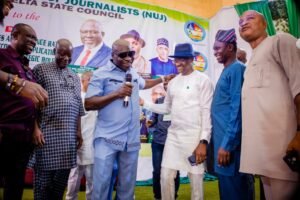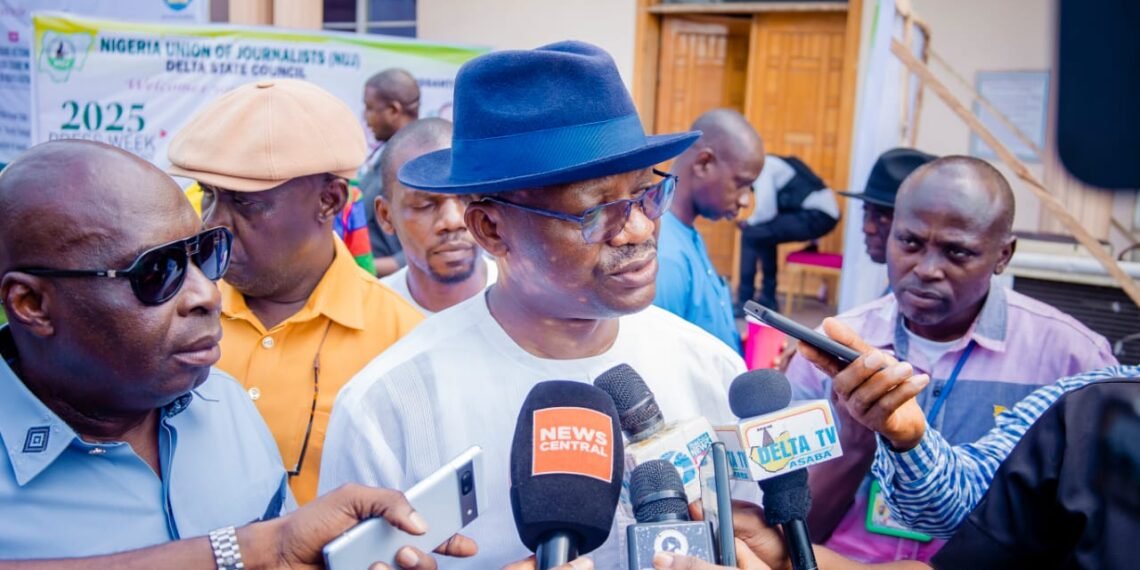Delta State Governor, Sheriff Oborevwori, has underscored the importance of a fair tax structure and a responsible media landscape as Nigeria continues to adjust to evolving economic realities.
Speaking at the 2025 Press Week of the Nigeria Union of Journalists (NUJ), Delta State Council, held at Orchid Hotel, Asaba, the governor, who was represented by the Commissioner for Works (Rural Roads) and Public Information, Mr. Charles Aniagwu, highlighted taxation as a fundamental pillar of national growth.
Anchoring his message on the theme: “Tax Regimes and Exchange Rate Unification: Economic Implications and the Media’s Strategic Role,” Gov. Oborevwori noted that robust taxation is indispensable for sustainable development.
“Without effective tax regimes, no government can sustainably provide infrastructure, healthcare, education, and security,” he stated.
However, he stressed that tax policies must be clear, equitable, and designed to stimulate economic expansion.
The governor said excessive or complicated taxes repel investors, while weak tax collection systems hinder progress.
He restated his administration’s resolve to widen the state’s tax net, block loopholes, and ensure prudent use of public funds.
Turning attention to the federal government’s exchange rate unification policy, Gov. Oborevwori described it as a courageous effort to stabilise the naira and improve Nigeria’s competitiveness globally.
Though the policy has created short-term hardships, he maintained that its long-term outcomes are promising.
 “These reforms will bring greater investor confidence, a level play field for businesses, and enhanced competitiveness for Nigerian goods and services,” he said.
“These reforms will bring greater investor confidence, a level play field for businesses, and enhanced competitiveness for Nigerian goods and services,” he said.
He observed that Delta State, with its rich oil, gas, and agricultural assets, stands to benefit greatly from a more predictable exchange rate regime, which is key to export growth and broader economic diversification.
The governor further acknowledged that ongoing economic reforms have direct implications for everyday life—from product prices to wage levels and the resilience of small enterprises.
He assured that the state government is implementing measures to cushion these effects through targeted support for households and local businesses.
Read also:
- NEW MINIMUM WAGE: We are taking our time to avoid mistakes – Oborevwori
- Oborevwori’s urban renewal strategies yielding results – Aniagwu
- Lawmaker lauds Gov Oborevwori on completing past administrations’ projects
On the central role of the media, Gov. Oborevwori reminded journalists that they remain essential in fostering public understanding during periods of reform.
“You are the bridge between policy and the people,” he emphasised, urging reporters to serve as educators, watchdogs, and defenders against misinformation.
He warned that misleading or sensational reporting could worsen societal tensions and erode trust in institutions.
“With great influence comes a solemn responsibility,” he cautioned, calling on journalists to uphold objectivity and professionalism in their work.
The governor reaffirmed his administration’s readiness to work closely with the media by promoting open governance and access to information.
“As we celebrate Press Week, let us remember that the pen, the microphone, and the camera are powerful instruments. Used responsibly, they illuminate the path to economic stability, social justice, and national prosperity.
“Together, we can build a Delta State and a Nigeria where reforms are embraced as stepping stones to greatness,” he added.
Delivering the keynote address, Senator Joel-Onowakpo Thomas, representing Delta South, stressed that tax harmonisation and exchange rate unification form a core part of President Tinubu’s broader economic stabilisation agenda.
Represented by Mr. Uzuazo Ikelegbe, he reiterated: “These reforms are not abstract ideas; they are strategic actions that rebuild an economy that works for all.”
Earlier, the Delta State NUJ Council Chairman, Churchill Oyowe, said the theme was chosen to stimulate meaningful discourse and reinforce the media’s dual responsibility as a watchdog and a link between policymakers and the populace.
“The Nigerian journalists must not only report policies but interpret them in ways that empower citizens to make informed decisions,” he said.
He commended Gov. Oborevwori for strengthening press freedom and driving people-centred development under the MORE agenda, noting the administration’s impact in education, healthcare, infrastructure, and youth empowerment.






